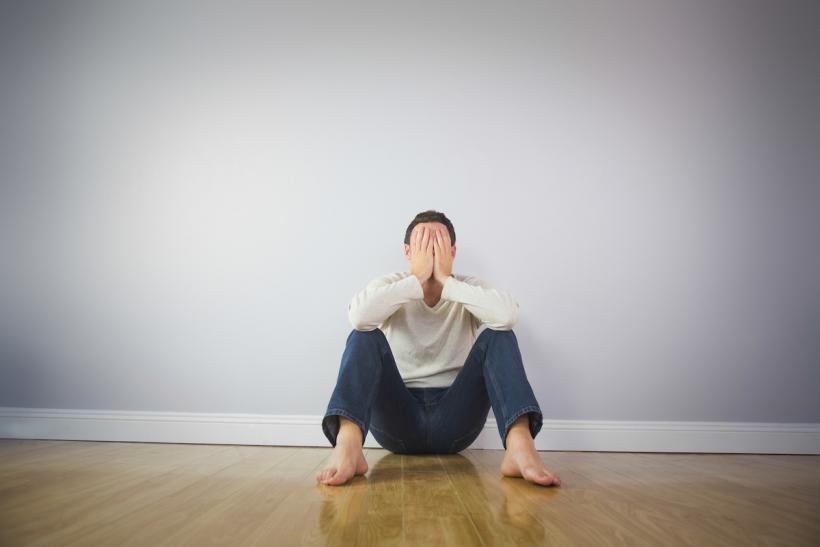
Mental illness was a fact in my family, but not something that affected my daily life. Image: Thinkstock.
By introducing my father’s illness as a fact during a time when his mental health had no negative effects on my life, my parents enabled me to live without stigma…
“What I always want you to think about is this: Dad has a disease. If he had cancer, or diabetes, everyone would want to help. Why should it be any different because he has a mental illness?”
I was sitting in the car with my mother, on a tree-lined street in our neighborhood. I was about 9, and we were either waiting for one of my siblings to emerge from a play date, or for my father to finish an estimate for his painting business. I can’t remember exactly why we were there, but I know precisely where we were parked.
And although I can’t remember what brought on our conversation — my father seemed healthy and stable, at least in my childish eyes — my mother's question has always stuck with me.
Growing up, I always knew that my father had bipolar disorder.
In my home, we talked about his illness in the way that experts now advise parents to talk about sex: in a series of small, on-going, organic conversations that make a taboo topic easy to discuss. I always felt open to ask questions, but I rarely felt I needed to.
My father was hospitalized when I was 5, but I remember little about it other than enjoying the arts and crafts supplies during family visiting at the hospital. After that, he was stable for most of my childhood. Mental illness was a fact in my family, but it wasn’t something that affected my daily life.
In seventh grade, I chose to do my element report on lithium because I knew that that was the name of the medication that my father took to treat his bipolar. For my senior thesis in high school, I chose to research stigma surrounding mental illness and stigma reduction techniques.
I hooked my advisor, an epidemiologist at the Boston University School of Medicine, by asking her the same question my mom asked me years before: “Why is mental illness treated so differently from physical illness?”
Just as there would be no shame in the flare-up of a physical disease, there should not be shame in an episode of mental illness.
During one of our conversations, my advisor asked about my father’s health. She was amazed that he had been so stable for so long, especially after I let it slip that he had come off his medications and now controlled his disease through diet and exercise. As an expert and a doctor, she must have seen the inevitable crisis that I wasn’t aware was coming.
When I was growing up, my family’s conversations about mental health took place during a calm period in my father’s health. I didn’t understand why there would be so much stigma around an illness that my father seemed to be managing just fine.
By introducing my father’s illness as a fact during a time when his mental health had no negative effects on my life, my parents enabled me to live without stigma, which in turn empowered me to advocate for my father’s treatment when his health took a turn for the worse my freshmen year of college.
“Dad’s in the hospital,” my mom said on a spring day as I prepared to leave for class. As I rearranged my obligations at school to be with my family, I considered my cover story.
Then, I realized that I didn’t need one. I hadn’t been raised to hide mental illness, even during times of crisis.
Just as there would be no shame in the flare-up of a physical disease, there should not be shame in an episode of mental illness.
I remember taking a deep breath and speaking encouraging words to myself before I told my roommate, “My dad has bipolar disorder, and he is in the hospital.”
I would need to speak that phrase many more times over the next decade. My father’s hospitalization that spring was the beginning of a ten-year battle with severe bipolar disorder and disabling medication-resistant depression. I am still dealing daily with the heartbreak and frustration of loving someone with severe, chronic mental illness.
And each day I am wildly thankful that my parents raised me without stigma.
Because of their approach, I was able to skip past the first stage for many families dealing with mental illness: shame and denial.
Instead, I was able to begin immediately advocating for the needs of my father and our family.
When my mom posed that question twenty years ago, she couldn’t have possibly imagined the mental health crises that would plague our family. She just knew that whether her children had first-hand experience with severe mental illness or not, they should know that mental illness is a biological disease. At the time, we were not a family dealing with mental illness on a day-to-day basis. Her simple question could easily be asked in a family that did not have first-hand experience with mental illness.
I will forever be thankful that my parents spoke openly about mental illness and empowered me to advocate for the rights of people with mental health disorders. I share my family’s story regularly in hopes that by speaking out I can inspire others to share their experiences, and start conversations that matter.
By rejecting fear and shame, we as a society can empower people with mental illness and their families to speak out.
We can remove stigma and discrimination as the biggest barriers to treatment for people with mental illness.
And when someone asks why mental illness is different from physical illness, we can confidently answer, “It isn’t.”







![Photo By Dr. François S. Clemmons [CC BY-SA 4.0 (https://creativecommons.org/licenses/by-sa/4.0)], from Wikimedia Commons](/sites/default/files/styles/profile/public/images/article/2019-06/Mr.%2520Rogers%2520%25281%2529.png?itok=LLdrwTAP)
